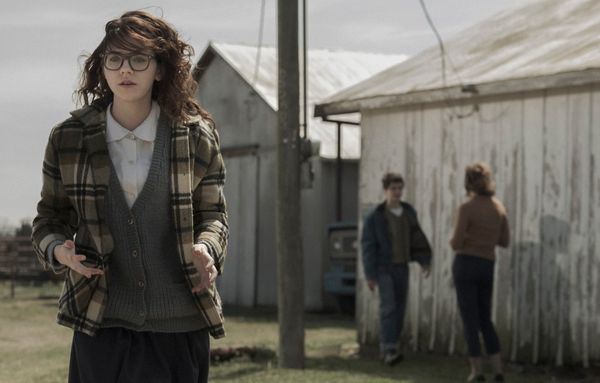Eye For Film >> Movies >> To The Stars (2019) Film Review
To The Stars
Reviewed by: Jennie Kermode

In a small town, everything is a big deal, and with the intense social conformity of early Sixties Oklahoma to deal with as well, life is tough for young Iris (Kara Hayward). She's mocked because she has poor bladder control, which is probably itself the result of bullying, and a long walk to school down an open road makes her an easy target for the sort of aggression that kids know all too well but adults routinely refuse to take seriously: jeering, shoving, kicking her books around, making sexual threats. The situation feel so hopeless that she doesn't even try to fight back - until one day new girl Maggie (Liana Liberato) drives up and starts throwing stones, and everything changes.
A sweet albeit rather slight tale about the liberating power of friendship, To The Stars explores the growing connection between its young heroines whilst highlighting some of the social issues of the era. The early revelation that Maggie's family has moved there to escape some scandal provides a pretty heavy hint as to what her issue is, as does her intense focus on transforming Iris through a series of beauty treatments and wardrobe changes that help bring her out of her shell. Iris is just a bit too savvy to go along with this wholesale. Her reclamation of the glasses she's been told to manage without is a nice touch, demonstrating that she has er own sense of style and her own priorities - all she really needed to be given was confidence. The boy with whom she shyly begins to flirt has clearly liked her for some time, as we see in an early scene in which he fends off the predatory attentions of her mother.

The monstrous mother figure provides one of the more interesting elements of the drama, inviting us to wonder how she has been damaged by life in a culture of this sort. Her pain is as obvious as her unpleasantness; Iris still loves her, and Iris' father provides balance, trying to protect his daughter without aggravating a wife who has clearly fallen out of love with him. These unhappy adult lives, accompanied by insights into the nastier side of the townsfolk which emerge later in the film, cast long shadows over the young people's world. Director Martha Stephens uses a palette full of soft browns and pastels designed to evoke nostalgia but shows us plenty of cruelty just under the surface, from the verbal sniping of teenage girls to the very real potential for violence among those who should be old enough to know better.
With its quaint little buildings and absence of black faces, this is the kind of fetishised American town associated with whimsical memoirs which neatly erase the tensions gripping the nation as a whole, but Stephens brings them home, an not always by way of the characters we might expect. Although there's a whiff here of Maggie being presented as the magical outsider who helps Iris shift from one wholesome (if unhappy) archetype to another without really having to sacrifice anything, Iris is a little more complicated that most such protagonists, and Liberato gives Maggie a quiet intensity which helps to drive the film forward at a dramatic level. Parts of the plot feel contrived, especially towards the end, but overall this is a warm-hearted film that will appeal to teenagers bored of fast-cut squealing comedies and blockbusters.
Editor's note: there is also a version of this film graded in black and white, which has been screened at several festivals.
Reviewed on: 28 May 2020
















